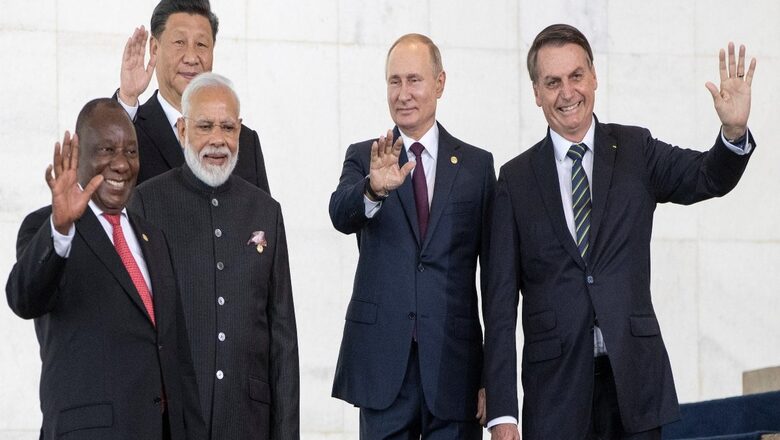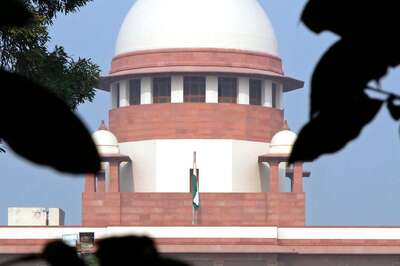
views
As South Africa gets ready to host the BRICS summit later this month, Russian President Vladimir Putin will not be the only head of state to not be in attendance. India’s Prime Minister Narendra Modi too is unlikely to travel to South Africa for the summit. Both PM Modi and President Putin will be attending the summit virtually. However, the reasons these two leaders are giving an in-person attendance a miss are quite different. While Russia is wary of President Putin getting arrested on a warrant passed by the International Criminal Court, PM Modi’s absence has more to do with India’s growing tilt towards the West.
Hear it from the horse’s mouth. An Indian government official has been quoted by Reuters as saying that there is growing discomfort in New Delhi about being part of groupings like BRICS and SCO which China dominates, especially as India inches closer to the United States and other Western powers.
Remember, India hosted a virtual SCO summit days after Prime Minister Modi’s state visit to the United States. New Delhi provided no official reason for hosting the summit virtually. However, when seen together with PM Modi’s reluctance to attend the BRICS summit in-person, the chips seem to fall in place. You see, China is attempting to make a comeback on the global stage after being bogged down by the Covid-19 pandemic. This was a pandemic that hit China’s image pretty hard. Today, tensions between China and the United States are running at an all-time high. The US has the Western bloc on its side. China is hopeful of creating a bloc of its own to challenge the West. The question is, which bloc does India figure in?
Surely not in the bloc China wants to control. China and Russia are pushing aggressively for the BRICS to be expanded. At least 30 countries have conveyed their willingness to join the group, while 22 of them have formally applied. India views such a rapid expansion of a rather exclusive grouping with suspicion, which is why it is resisting. What particularly unnerves New Delhi is how China is putting its weight behind the proposed expansion of the BRICS grouping. Already, BRICS accounts for more than 40% of the world population and about 26% of the global economy. So, in China’s mind, expanding BRICS will effectively create a counterweight to the US-led Western order.
WHY INDIA REMAINS CAUTIOUS
India’s approach to what’s happening to the present world order can best be described as cautious. India fundamentally recognises the threats posed to the world by a hegemonic order influenced primarily by a few nations in the West. At the same time, India is a democracy. It has much more in common with Western democracies than it does with China. In fact, India is the only country that has exchanged physical blows with China. The military standoff with China continues. As such, the Prime Minister sharing the stage with Xi Jinping in South Africa would not have been a good look.
You might argue that the Prime Minister has shared the stage with the Chinese ruler in the past as well — case in point being the G20 summit in Indonesia last year. But remember, the summit in Indonesia was one in which several Western powers participated as well. BRICS, on the other hand, is being staged as a group which seeks to challenge the West and its influence over the world order. That is not a position India is comfortable to take.
India is now drawing a line. It has a long and trusted partnership with Russia. So, when Russian troops marched down Ukraine, New Delhi consciously chose to not take sides in the conflict. It still calls for dialogue and diplomacy between the two warring nations to end the conflict. PM Modi even famously told President Putin that “this is not an era for war”. At the same time, India has stepped up oil purchases from Russia in an unprecedented manner.
But with China trying to make BRICS and SCO groups that challenge the West, India has had to reevaluate its strategy. New Delhi can justify keeping its partnership with Russia intact. What it cannot justify is being part of a Chinese campaign to directly take on the West. After all, India has robust ties with almost all Western nations. These are ties that intertwine India’s economy with the West and also help it reduce reliance on Russian military hardware.
To top it all, India is locked in a military standoff with China. China has a reputation of being an expansionist and aggressive power in the Indo-Pacific. This is a country that is expected to eventually invade Taiwan. So, India knows it cannot aid Beijing’s campaign to take on the West. After all, if a conflict between the West and China does break out, it is quite predictable whose side India will be on. In fact, in the event of a conflict between India and China, New Delhi knows it can count on countries like the United States. After all, it is quite a known fact that the US has been sharing crucial intelligence with India that has helped it counter China in the Himalayas.
Being hand-in-gloves with China to challenge the West would not augur well for India’s own interests. India has strong ties with the West. These could be jeopardised if New Delhi were to side with Beijing and Moscow in groups like the BRICS and SCO. India is no fan of Western neo-imperialism, and has called it out on more occasions than one. However, India also knows where to draw the line.
Most importantly, India sees itself as a natural leader of the Global South. That is a coveted title, and China is eyeing it too. So, distancing itself from groups which China is keen to dominate appears to be India’s strategy.
Views expressed in the above piece are personal and solely that of the author. They do not necessarily reflect News18’s views.
















Comments
0 comment